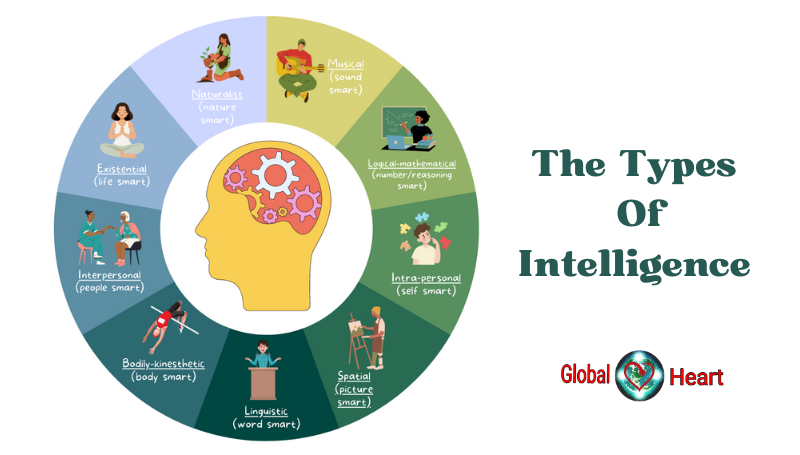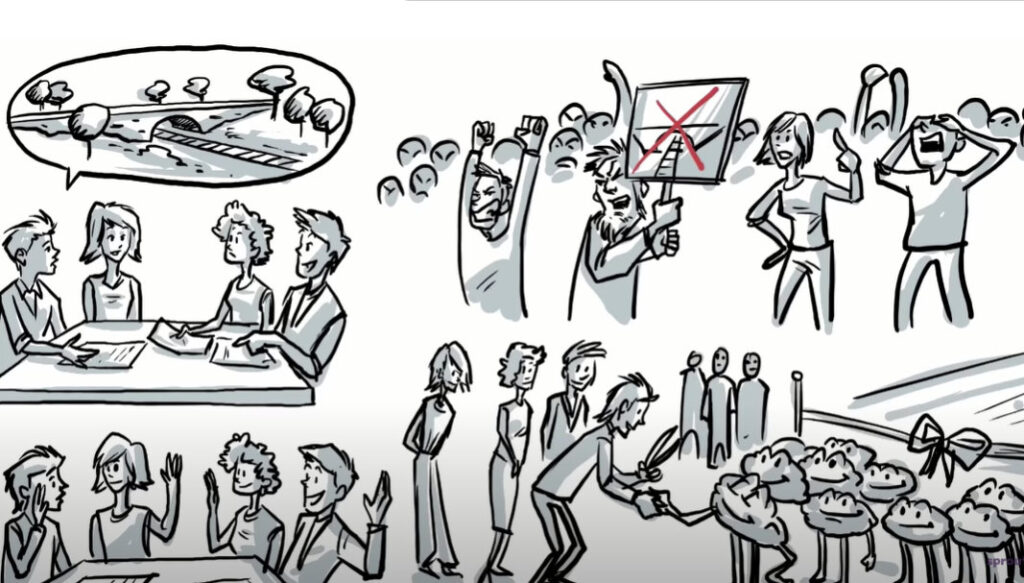You think you are smart? There are 9 types of intelligence!
Have you ever wondered what makes someone ‘smart’? According to Gardner, there are actually nine types of intelligence which means we could all be ‘smart’ in different ways. Some of us are life smart and some of us are number smart. But what does that mean exactly?
Keep reading to see the full picture.
The full story
In 1983, American psychologist, Howard Gardner published a book with a theory that there are nine types of intelligence.
To understand this theory, let’s consider the problem of the council of Newtown, who wants to build a bridge over the dangerous railroad tracks. But there is strong opposition from some citizens who don’t like change. Despite the demonstrations, the council agrees to go ahead and then hires a team of 9 experts from Smarts & Co. to get the job done. Let’s introduce each one of them:

Visual- spatial (Picture smart)
Miss Picture Smart played a lot of hide and seek when she was young. And she loved puzzles. She has lots of imagination and ideas about shapes. Her job in the project is to create the plans, make the designs and build a prototype.
Naturalistic (Nature Smart)
Mr. Nature Smart loves trees and he has great ideas of how to minimize the impact of a bridge on the environment. He started thinking of these issues ever since the first time he went summer camping with dad. He developed a passion for all living beings.
Logical-mathematical (Number smart)
Mrs. Number Smart is a nerd. She always was. In the playground, she was already calculating the sand buckets needed to build the biggest castle. In high school, she was the Chess-master and everyone was so proud of her. She will calculate the costs, study workers safety issues and estimate the raw materials needed. Her concerns are the budget, resources, and risks.
Interpersonal (People smart)
Mrs. People Smart arranges a town meeting and goes out to invite all the citizens to come. She was always good with people. As a kid, she spent most of the time outside with her neighbors. As a teenager, her mom explained to her that most people mean well, even if they have trouble showing their feelings. Today, everyone loves her and she does a great job convincing everyone, even the most outspoken opponents.
Verbal-linguistic (word smart)
Miss Word Smart has been keeping a diary since she was young. In maths class, she wrote poems and during field trips, she didn’t talk to others but instead studied the travel guide. For the big town hall meeting, she writes a convincing speech, filled with hard facts, big feelings, and good metaphors.
Existential (Life smart)
Ever since he was young, Jimmy Life Smart knew how to talk and entertain. Today he shows his skills on the stage. He starts his speech with a personal story about his cat that once got lost on the train tracks. Then he delivers all the arguments with so much passion, that all citizens can only agree with the plan. Ms. Word Smart is delighted to see the impact of her work.
Bodily-kinesthetic (Body smart)
Now, as construction starts, Mr. Body Smart gets ready to get things done. Even the children are inspired by his power and want to help. During the breaks, he plays football with his team, which is fun and teaches him balance skills he later can use high up in the sky.
Intrapersonal (Self smart)
Madame Self Smart knows a lot about feelings: our fears, joys, and anger. She learned this from her own past where she started to reflect on herself. But she also reads a lot about feelings and talks to her friends about their emotions. During the construction, she is the positive force, motivates those that feel down and solves tensions that can come up when we collaborate.
Musical (music smart)
While everyone is busy finishing the bridge, Mrs. Music Smart writes a song for the grand opening. She has loved music ever since she started playing the piano. Later she moved on to Hip Hop and Jazz-Dance. At the opening ceremony of the bridge, she and her band perform the song. It was a fantastic team effort from all 9 of the Smart and Co.
What do you think?
In 2016, Gardner said that he is considering adding pedagogical intelligence, or “teach smart”. What do you think? Is he right or wrong about these types, or are IQ, EQ or other forms of intelligence better classifications? Please be “teach smart”, and tell us what you think about intelligence theory in the comments below.
“These intelligences are used to modify teaching methods and strategies because each learner has different needs and learning style. Great video!”
– Sweet Kristin Aquino-Gibela
Sources
- Theory of multiple intelligences – Wikipedia
- Gardner’s Theory of Multiple Intelligences – Verywellmind
Dig deeper
- Learning styles – Wikipedia
- What kind of intelligence do you have? – Verywellmind
- How IQ and Intelligence Affect Our Life (or Not!) – Sprouts
Source: Sprouts
You may also like:
What is sapiosexual preference? 6 signs you’re attracted to intelligence
Are mood disorders the price we pay for high intelligence and creativity? Scientists say “yes”




